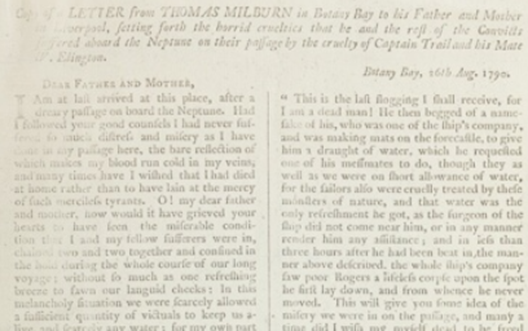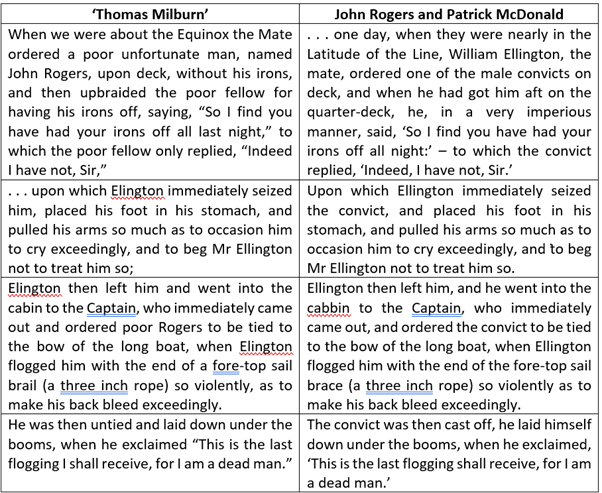(Not) A Letter from the 'Neptune' (1790)
The State Library of NSW holds a copy of a broadsheet published in London in 1792, which purports to be the text of a letter from a convict who sailed on the ‘Neptune’, describing the dreadful conditions the prisoners suffered on that voyage. It‘s a fake.
Gary L. Sturgess
4/14/20252 min read
No first-hand accounts are known to exist written by convicts who sailed on the ill-fated Neptune in 1790, with the possible exception of a letter by a prisoner named Thomas Milburn, the text of which was published two years later as a London broadsheet. A copy of this document is held by the State Library of New South Wales, the catalogue of which states:
‘Copy of a letter from Thomas Milburn in Botany Bay to his father and mother in Liverpool: setting forth the horrid cruelties that he and the rest of the convicts suffered aboard the Neptune on their passage by the cruelty of Captain Trail and his mate W. Elington.’
There are several problems with this. No convict of that name sailed on the Neptune. Nor was there a prisoner named Humphrey Davies, to whom ‘Milburn’ claimed to have been chained throughout the voyage. The broadsheet names John Rogers as one of the convicts who died, and while there was a prisoner of this name on the Neptune, he survived the voyage.
Textual analysis of the letter reveals that parts of it were taken from depositions provided by a seaman named John Rogers who sailed on the Neptune as one of the crew. [1]


Detail from the Thomas Milburn broadsheet, State Library of NSW Q994.4103/5
Thomas Evans, the attorney who took this statement, was a crusading lawyer who specialized in sailors’ causes. In August 1791, he was approached by several former members of the Neptune’s crew, complaining that they had not been paid, and that they had been physically abused throughout the voyage, resulting in the deaths of several of their number. Evans realized that allegations about abuse of the convicts would attract the attention of government, and he immediately published advertisements in the papers calling for former crew members and relatives of the Neptune’s convicts to make contact.
Evans had had never felt constrained by the rules and conventions of his profession, and over the following months, he engaged in a series of questionable practices to attract attention – publishing an ‘Address to the Public’, summarising what he claimed to have discovered about the voyage, which he sent to all Members of Parliament, feeding stories to friendly newspapers, and distributing handbills in the street.
The government was goaded into taking over the prosecution of Donald Trail, the master of the Neptune, and his chief mate, William Elrington, but the jury promptly acquitted them after their counsel, the legendary criminal barrister, William Garrow, exposed Evan’s unprofessional behaviour.
Evans was struck off the rolls and a criminal prosecution was initiated. According to newspaper reports of a hearing held several weeks after Trail’s acquittal:
'It would appear that in order to prejudice the minds of the Jury against these innocent people, that Evans, who was Attorney for the prosecution, had published hand-bills, containing the depositions of the different witnesses who were afterwards examined, with an intent to excite the resentment and indignation of the public against those Gentlemen who were honourably acquitted.' [2]
It is clear that the Milburn broadsheet is one of these handbills published by Thomas Evans as part of this campaign. He was never readmitted to practice in England, fleeing to Ostend where he established a legal firm, once again specialising in maritime law.
_________________________________
[1] Deposition of John Rogers and Patrick McDonald, Evening Mail, 4-7 November 1791.
[2] The Times, 25 June 1792.


Contact us
Connect with us
Botany Baymen acknowledges the traditional custodians of country throughout Australia and respects their connection to land, water and community.
© Botany Baymen 2024. All rights reserved.
You may download, display, print and reproduce this content for your personal or non-commercial use but only in an unaltered form and with the copyright acknowledged.


